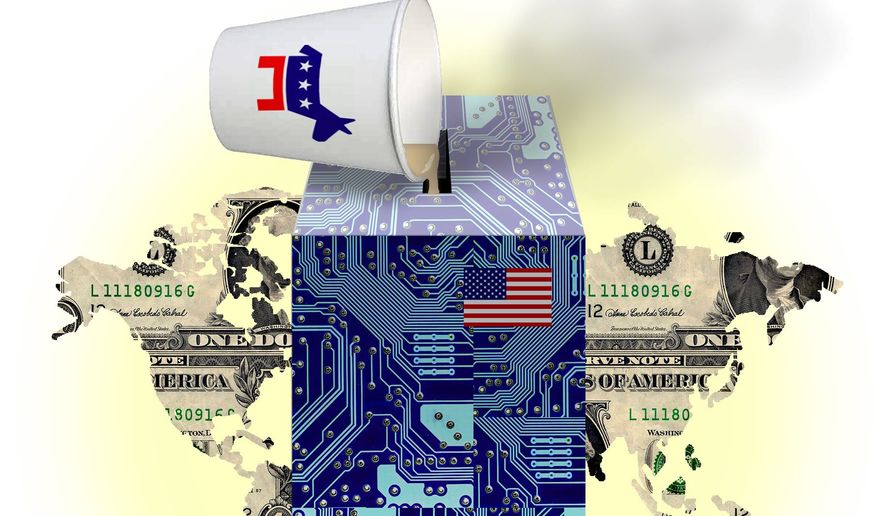OPINION:
Earlier this month, congressional Democrats under the leadership of Rep. David Cicilline, Rhode Island Democrat, published an antitrust manifesto that would throw years of successful antitrust enforcement into the dustbin of history. Worse, it would put unelected bureaucrats who no longer would need the consent of Congress in charge of reshaping America’s economy.
Thankfully, no Republicans signed onto Mr. Cicilline’s report. Even so, the news is mixed — a growing chorus of Republican lawmakers say antitrust laws need to be changed to allow for greater enforcement against Big Tech. But by handing Democrats the cover they need to reform antitrust, Republicans may inadvertently enable the biggest change to antitrust law in over a generation.
Mr. Cicilline outlined in the report how he thinks Democrats should approach antitrust enforcement on Big Tech if Mr. Biden wins the election — and consequently received the support of every Democrat on the House Judiciary Antitrust subcommittee. The underlying argument ignores how existing competition rules have enabled the American economy to be the most innovative and influential in human history. Instead, the report replaces them with rules focused on progressive ideals rather than protecting the consumer.
The central recommendation of the report is that Congress should pull antitrust law away from using the “consumer welfare standard.” This standard requires antitrust action only be used if there is evidence of consumers being harmed by a use of monopoly power. Mr. Cicilline’s report says a new standard should be created “to protect not just consumers, but also workers, entrepreneurs, independent businesses, open markets, a fair economy, and democratic ideals.”
By handing such broad authority to unelected bureaucrats at the Federal Trade Commission and the Department of Justice, such a proposal would create a huge expansion of unaccountable government power over our economy aiming to fulfill progressive policy goals without the backing of our elected Congress.
The impact of the report’s recommendations could affect more than just America’s tech companies. It could stop supermarkets from selling their own-brand products, like Costco’s “Kirkland” brand or Walmart’s “Great Value” line. Regardless of how much consumers enjoy low-cost options, according to Mr. Cicilline, allowing a business like Amazon to both run a marketplace and to sell its own products harms competition.
By refocusing antitrust law away from protecting consumers and toward protecting populism, these changes to antitrust law could spell antitrust action addressing issues unrelated to competition like wealth inequality, election interference or a litany of other issues. Even if many of these issues require government intervention, antitrust enforcement is not the appropriate tool.
Thankfully, some Republicans remain strongly opposed to revolutionary changes to our antitrust laws. Republicans on the House Judiciary Subcommittee did refuse to sign onto Mr. Cicilline’s report. Rep. Jim Jordan, Ohio Republican, went even further, challenging “the Democrats’ partisan report … [as it] advances radical proposals that would refashion antitrust law in the vision of the far left.”
Angered by alleged anti-conservative bias in social media’s content moderation, some Republicans like Rep. Buck, Colorado Republican, or Sen. Josh Hawley, Missouri Republican, also say antitrust law could be used to tackle this perceived problem. These Republicans should look to their small government principles and know how once you empower the state to use antitrust law to regulate sensitive issues like speech, it can easily be abused by another administration to enforce that much more regulation.
If antitrust law could be used to punish social media sites that conservatives think remove or label too much content, then they could just as easily be used to punish sites that liberals think remove or label too little content. If Republicans back giving bureaucrats a blank check to regulate any big business however they see fit, they will regret it as soon as Democrats eventually gain power in D.C.
Thankfully, Mr. Cicilline’s report provides free marketeers with good evidence that reformed antitrust rules would be used to further far more left-wing goals than just market competition.
In an age where skepticism of Big Tech has grown on both sides of the aisle, lawmakers should remember that while small businesses are the backbone of the American economy, Big Tech platforms have been revolutionary in assisting America’s entrepreneurs in reaching new customers. The pre-pandemic booming economy was almost certainly fueled by the growth in tech services. If we rip apart America’s tech sector, we will also undermine our economic recovery and some of the most profitable companies in the world.
While Republicans may have their concerns about tech, they must choose if they want to maintain President Reagan’s antitrust legacy — a legacy that has entrenched the U.S. as a global economic leader in more industries than just technology — or to throw it to the dustbin of history in a fruitless crusade against Big Tech. If they choose the latter, we’re all going to lose.
• Robert Winterton is a tech policy fellow for Young Voices and director of public affairs for NetChoice.




Please read our comment policy before commenting.